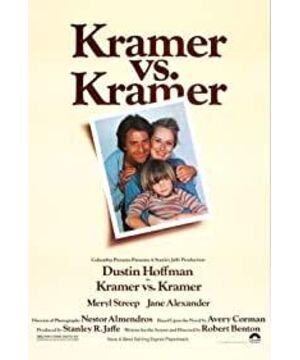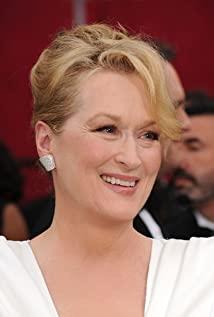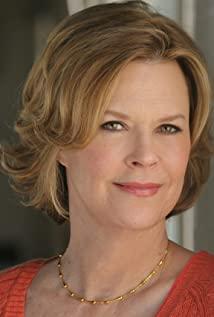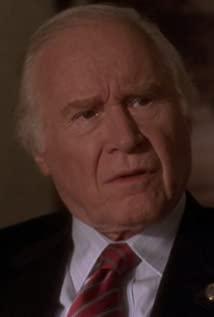I finished watching "I Am Sam"* with my mother a few years ago, and I appreciated it, and she recommended me the old film "Kramer vs. Kramer" with a similar theme^. The movie is starring Dustin Hoffman and Meryl Streep, and it's a gorgeous cast. The story tells that Joanna suddenly ran away one day, leaving behind Ted and Billy. For a year, Ted tried his best to take care of his son, but Joanna suddenly came back one day to fight for custody...
The script of this film was obviously written with the heart, no wonder it won the Oscar for Best Adapted Screenplay that year. The characters do not need to express their inner feelings deliberately. Through the subtle and attentive dialogues, they say a few words from time to time, expressing the feelings of the characters simply, directly and truly. Take the role of Ted Kramer as an example, he took the initiative to mention to his friends the trivial things about getting along with Billy, and finally ended with the sentence 'He was so cute. You know?', moved to tears when his son learned to ride a bicycle. These things show Ted's love for his son, and of course Dustin Hoffman's skill should also be credited.
See at IMDB, Hoffman and Streep are more or less involved in scriptwriting! The former experienced a marriage change at the time, which provided a lot of realistic feelings and dialogues for the characters, while the latter was dissatisfied with the closing statement of the original draft in the last court scene, so he wrote it separately. The creative effect of the two actors is very good. Meryl Streep's speech of about half a minute is candid and candid, and at the same time expresses the contradictions in the characters. (Joanna has admitted that she is incapable of taking care of her son, and her reason for leaving to "find myself" is selfish.)
Plus, it turns out that several of the scenes were improvised or accidental: Ted stopping Billy from eating ice cream before dinner, talking to Joanna about Ted's raging glass of wine when he left in a fit of rage (and Joanna's forced composure, panicked look), Joanna cried and asked Ted how she looked and so on. The drama is always a drama, and the plot is a bit exaggerated, but the director allows the actors a lot of freedom. They can naturally improvise and edit dialogues according to their character's mood, and then cooperate with their own high-quality script. The actors' sincere acting skills greatly enhance the realism of the film, and the various emotions rendered in the play also become real and moving.
Overall I'm pretty happy with the movie--in fact, it's satisfying to see Dustin Hoffman and Meryl Streep's stellar acting and good looks--but I'm not too fond of the superfluous dialogue towards the end. That scene was Ted letting Joanna visit Billy alone. Meryl Streep got into the elevator to read the dialogue, thinking the director had called to stop, so she wiped her face with her hands and asked Hoffman 'How do I look?'. Personally, I think it can be stopped here. The supplementary response 'Beautiful.' was completely redundant, the questioner did not expect an answer, and the headshot of the scene was abrupt. The focus of the movie was never the relationship between the (former) husband and wife, not to mention that the previous scene of "Resolving Allegations" made it very clear. 'How do I look?' is a question, with an unfinished meaning, which triggers the audience's imagination: Will the clever and clever Billy notice her mother's tears? What will happen to everyone when she leaves? ...the answer of 'Beautiful' ends the question and ends the play. This sudden word seems to block people's thinking space and destroy the atmosphere of the play.
The title of the movie is "Kramer vs. Kramer". Before I saw it, I thought it was just referring to the custody battle between the father and the mother. The 'Kramer vs. Kramer' in the play can be divided into two scenes: the first is Ted and Billy, Ted Kramer who has never been a "mother" vs Billy Kramer who suddenly lost his mother; the last is Joanna Kramer vs Ted Kramer. Ted won both "battles" beautifully. Billy changed his mind about his father, Ted became a successful single father, his friends admired him, and the court ruled in favor of the woman, but Joanna was moved by Ted and gave up custody.
In the play, Ted cooks toast for his son twice. The first time there are many mistakes, the production process is very scary, and the frying pan is thrown to the ground. After more than a year, he skillfully beat eggs, mixed ingredients, dipped egg yolks, and dropped the pot, and successfully cooked golden-brown West Toast. Although the front-to-back comparison of "West Toast" is a bit like drawing a doll's intestines, it clearly points out the positive transformation of each person. Or 'Kramer vs Kramer' can also refer to the personal struggles and changes of several Kramers, ie "New Kramer" vs "Old Kramer". 'Kramer vs Kramer' is indeed both interesting and interesting.
Oscars for the show: Best Director for a
Movie - Best Adapted Screenplay for Robert Benton - Best Actor for Robert Benton - Best Supporting Actress for Dustin Hoffman - Best Supporting Actor for Meryl Streep - Justin Henry (Billy Kramer) ) Best Supporting Actress Nomination - Jane Alexander (as Margaret Phelps, Friend) Best Cinematography Nomination Best Editing Nomination
*The Chinese name of "I Am Sam" is good, so I followed it; Sam quoted Ted Kramer's dialogue when confronting the judge in the play.
^ The Chinese title of "Kramer vs. Kramer" is a free translation and can be omitted.
View more about Kramer vs. Kramer reviews











